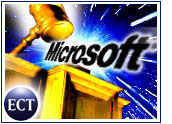
Microsoft is facing criticism over compliance with its antitrust settlement as several states raise concerns that the deal is not promoting as much software competition as it was supposed to.
In a court filing late last week with the U.S. District Court, 16 states plus Washington, D.C., complained that Microsoft’s protocol-licensing program is prohibiting competition because of its complexity.
In a separate complaint also filed late last week, settlement holdout Massachusetts — still seeking harsher penalties for Microsoft’s tactics, which were proven to be anticompetitive — claimed the Microsoft Communications Protocol Program is ineffective and also might be both price-prohibitive and incomplete.
Microsoft has been attempting to comply with protocol-licensing demands since late last year, when the U.S. District Court joined the Department of Justice in identifying problems with this component of the settlement.
Unsettling Issues
The newest filing by the states complains that Microsoft’s protocol-licensing program — required by the settlement — is much too complicated. The filing refers to the licensing program’s length and the necessity for vendors to seek additional or expanded licenses in some cases.
Microsoft responded in its own filing that it is shortening the license agreement and making more protocols available to its competitors. The company contends it is fully complying with the court-imposed requirements from the settlement.
Massachusetts, however, complained in its own separate filing last week that Microsoft might be excessively pricing the protocols and that the information the company has made publicly available is incomplete.
Massachusetts Attorney General Tom Reilly’s office went even further in criticizing the company, reporting it is reviewing allegations that “Microsoft is currently engaged in a campaign against various Internet search engines similar to the campaign it previously waged against Netscape’s Navigator browser.”
“We have also begun reviewing reports that a similar campaign is planned against document software such as Adobe Acrobat,” said the Massachusetts attorney general’s report. “If Microsoft is taking steps to hobble the competitive effectiveness of these rival products and thereby supplant them, such serial killing of competing technologies is a serious and troubling prospect.”
Browser Bends Rules
At the same time that other settlement issues are being raised, the U.S. Department of Justice recently issued an advisory on changes to Microsoft’s “Shop for Music Online” feature in Windows XP, which invokes Microsoft’s Internet Explorer browser even when the user has set a different default Web browser, such as Mozilla or Opera.
“Without necessarily agreeing with the Department’s position, Microsoft has agreed to remove the override of the user’s default browser contained in Shop for Music Online,” a Department of Justice statement said.
“The removal of the override resolves the Department’s concerns about this potential consent decree violation. Regardless of the reason for the change, the Department is pleased with the removal of the override and firmly believes that it is the appropriate outcome.”
Taking Steps
Microsoft has called the charges by Massachusetts regarding its protocol program unsubstantiated. Microsoft spokesperson Jim Desler, who called the antitrust settlement “tough in its restrictions on Microsoft business practices,” recently told TechNewsWorld that the company has taken several steps to comply with the deal.
Citing changes to license agreements with original equipment manufacturers, the ability to hide access to certain Microsoft applications, such as Explorer and Media Player, and the availability of more open programming interfaces and communications protocols, Desler said his company is committed to making the settlement work.
Microsoft spokesperson Stacy Drake told TechNewsWorld that the company is changing its protocol-licensing program to address the states’ concerns and is finalizing details for a status conference with the judge presiding over the settlement at the end of the week.
“We’ve worked very hard to make our protocol licensing program, and we are very open to government and industry feedback,” said Drake, who stressed that protocol licensing is only one aspect of the settlement. “We will be making a number of changes to further simplify the program to address the government’s concerns.”
In response to Massachusetts AG Reilly’s statement regarding newly alleged anticompetitive practices, Drake said it was difficult for her to comment because of the nature of the charges. “Those allegations are very vague and unsubstantiated,” she said.
Compliance To Compete
Yankee Group senior analyst Laura DiDio told TechNewsWorld that while anticompetitive issues persist around Microsoft, the company has changed somewhat and is now more amenable to its customers in terms of licensing and protocols.
However, DiDio said, the reason is not necessarily the company’s antitrust settlement, but is more likely Microsoft’s business response to other pressures, such as increased competition from Linux, other open-source software and rivals such as IBM and Oracle.
Meta Group vice president Steve Kleynhans told TechNewsWorld that most players in the IT industry have moved on from the two-year-old settlement. Even if there are issues still surrounding Microsoft’s compliance, companies likely would prefer that the industry resolve the matter, he said.
“Customers do have hard feelings toward Microsoft, but I see them looking for resolution through the market rather than having the government ride in to save the day,” he said.





















































